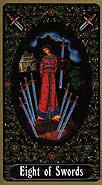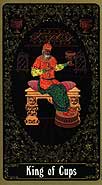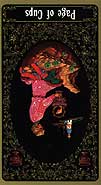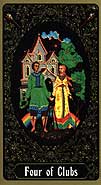| The Fourfold Vision spread offers a progression of different ways of looking at an object, person, or situation. It is a powerful tool for gaining deeper insight into the specific subjects of other readings. The Russian Tarot of Saint Petersburg is the final commissioned work of Yuri Shakov, a master in the lost art of Russian miniature painting. The rich, dark images lend themselves to questions regarding the struggle of the human spirit in trying times. If you would like your own copy of the Russian Tarot of Saint Petersburg, you can buy it now! |
 | The card on the far right represents the object being viewed, be it an idea, relationship, or the self. Eight of Swords (Interference): Crisis. Conflict. Domination. Imprisonment. Turmoil. Bad news. Criticism. Sickness. Calumny. |
 | The card second from the right represents the physical vision: how the object is seen at a base or mechanical level. King of Cups: Responsibility and creativity. Learned person. Professional. Businessman. Lawyer. Religious person. Scientist. A considerate person, kind and reliable. Liberal manner. Artist. Interest in the arts and sciences. Generosity. |
 | The card in the middle represents the mental vision: the object personified and seen through a humanized perspective. Page of Cups, when reversed: Inclination. Deviation. Susceptibility. Temporary distraction. Seduction. A flatterer. |
 | The card second from the left represents the emotional vision: how passions and values are creatively stimulated by the mental vision. Four of Clubs (Completion): Romance. Society. Harmony. Newly acquired prosperity. Tranquility. The fruits of labor. Rest after strife. |
 | The card on the far left represents the fourfold or mystical vision: still viewing through the previous three, we now add a spiritual element, revealing unseen aspects of the object. The Emperor: Worldly power. Confidence. Wealth. Stability. Authority. Indomitable spirit. War-making tendencies. Father. Brother. Husband. Male influence. Domination of intelligence and reason over emotion and passion. Patriarchal figure. |









